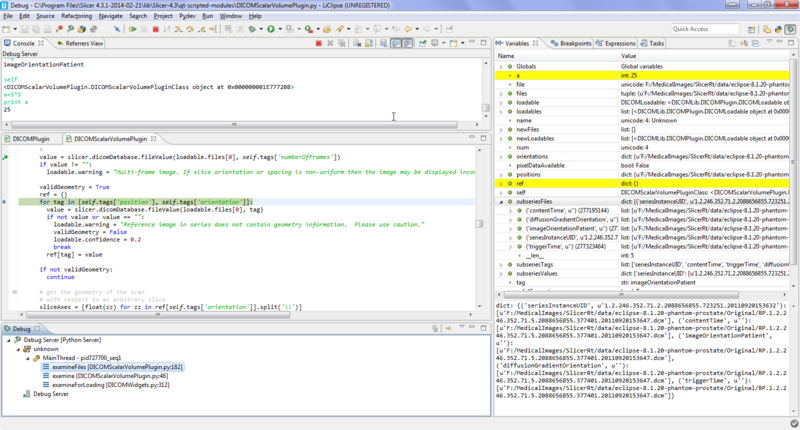Documentation/Nightly/Developers/FAQ/Python Scripting
|
For the latest Slicer documentation, visit the read-the-docs. |
Contents
- 1 Python Scripting
- 1.1 How to systematically execute custom python code at startup ?
- 1.2 How to save an image/volume using python ?
- 1.3 How to assign a volume to a Slice view ?
- 1.4 How to access vtkRenderer in Slicer 3D view ?
- 1.5 Should I used 'old style' or 'new style' python classes in my scripted module
- 1.6 How to harden a transform ?
- 1.7 Where can I find example scripts?
- 1.8 How can I use a visual debugger for step-by-step debugging
- 1.9 Why can't I access my C++ Qt class from python
- 1.10 How can I access callData argument in a VTK object observer callback function
Python Scripting
How to systematically execute custom python code at startup ?
Each time Slicer starts, it will look up for a file named .slicerrc.py into your HOME folder.
How to save an image/volume using python ?
The module slicer.util provides methods allowing to save either a node or an entire scene:
- saveNode
- saveScene
For more details see:
- https://github.com/Slicer/Slicer/blob/master/Base/Python/slicer/util.py#L229-267
- https://github.com/Slicer/Slicer/blob/master/Base/Python/slicer/tests/test_slicer_util_save.py
How to assign a volume to a Slice view ?
Assuming the MRHead sample data has been loaded, you could do the following:
red_logic = slicer.app.layoutManager().sliceWidget("Red").sliceLogic()
red_cn = red_logic.GetSliceCompositeNode()
red_logic.GetSliceCompositeNode().SetBackgroundVolumeID(slicer.util.getNode('MRHead').GetID())
Discussion: http://slicer-devel.65872.n3.nabble.com/Assign-volumes-to-views-tt4028694.html
How to access vtkRenderer in Slicer 3D view ?
renderer = slicer.app.layoutManager().threeDWidget(0).threeDView().renderWindow().GetRenderers().GetFirstRenderer()
Should I used 'old style' or 'new style' python classes in my scripted module
When python classes have no superclass specified they are 'old style' as described here [1].
In general it doesn't matter for the classes in a scripted module, since they won't be subclassed either old or new style should be the same.
For other python code in slicer where you might be subclassing, it's better to use new style classes. See the class hierarchies in the EditorLib and the DICOMLib for examples.
How to harden a transform ?
>>> n = getNode('Bone')
>>> logic = slicer.vtkSlicerTransformLogic()
>>> logic.hardenTransform(n)
Discussion: http://slicer-devel.65872.n3.nabble.com/Scripting-hardened-transforms-tt4029456.html
Where can I find example scripts?
Have a look at Documentation/Nightly/ScriptRepository.
How can I use a visual debugger for step-by-step debugging
Visual debugging (setting breakpoints, execute code step-by-step, view variables, stack, etc.) of Python scripted module is possible by using PyDev by using the Python debugger extension.
See detailed instructions at the Python debugger's extension page.
Why can't I access my C++ Qt class from python
- Python wrapping of a Qt class requires a Qt style constructor with QObject as argument (it can be defaulted to null though), which is public. If one of these are missing, python wrapping will fail for that class
- [Other reasons go here]
How can I access callData argument in a VTK object observer callback function
To get notification about an event emitted by a VTK object you can simply use the AddObserver method, for example:
def sceneModifiedCallback(caller, eventId):
print "Scene modified"
print "There are {0} nodes in the scene". format(slicer.mrmlScene.GetNumberOfNodes())
sceneModifiedObserverTag = slicer.mrmlScene.AddObserver(vtk.vtkCommand.ModifiedEvent, sceneModifiedCallback)
If an event also contains additional information as CallData then the type of this argument has to be specified as well, for example:
def nodeAddedCallback(caller, eventId, callData):
print "Node added"
print "New node: {0}".format(callData.GetName())
nodeAddedCallback.CallDataType = vtk.VTK_OBJECT
nodeAddedModifiedObserverTag = slicer.mrmlScene.AddObserver(slicer.vtkMRMLScene.NodeAddedEvent, nodeAddedCallback)
Allowed CallDataType values: VTK_STRING, VTK_OBJECT, VTK_INT, VTK_LONG, VTK_DOUBLE, VTK_FLOAT, "string0". See more information here: https://github.com/Kitware/VTK/blob/master/Wrapping/PythonCore/vtkPythonCommand.cxx
